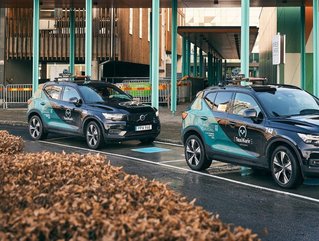Vattenfall starts wireless EV charging trials in Sweden

Just as mobile phones made the transition from plug in to wireless charging, electric vehicles look set to take the same technological journey.
As part of its efforts to accelerate fossil-free living, Vattenfall is testing wireless induction charging on taxis in Gothenburg.
The tests will assess how a fleet of taxis can be charged wirelessly, with payments taken electronically. Taking place at two locations in the Swedish city, the charging starts automatically when a compatible vehicle parks over a charging pad embedded in the street.
The charging station sends energy through the charging pad, which is picked up by a receiver unit in the car. In the car a vehicle identifier makes it possible to send an authorisation to Vattenfall that summarises the payment due once a month.
Vattenfall’s participation in the tests is part of the company’s broader mission to drive innovation that supports the transition to net zero, a particular focus of its R&D.
In addition to induction charging, Vattenfall is also accelerating the UK’s energy transition by making its own capital, knowledge and expertise available to last mile logistic companies and other UK businesses which are looking to transition to electric vehicle fleets.
Under the offer, known as Power-as-a-Service, Vattenfall will fund, build own and operate EV charging hubs on behalf of UK businesses, removing the need for companies to use their own finance, or own and operate their own private wire networks, making the transition to EVs as simple as possible.
“At Vattenfall, we always strive to improve ease use and customer experience. To be able to test new technology in close collaboration across industries and organisations brings great value for future development and to work towards fossil-free living,” said Susanna Hurting, Director of E-Mobility.
The induction charging project is an ongoing three-year collaboration with Volvo Cars, taxi operator Cabonline, hardware supplier Momentum Dynamics, Göteborg Energi and the development agency Business Region Gothenburg. The project hopes that pooling resources will lead to significant breakthroughs, with consequent long-term impact on electrical charging solutions across Europe.
The cars will be used for more than 12 hours a day and drive 100,000 km per year: this is the first durability test of fully electric Volvo cars in a commercial usage scenario, paving the way for future developments in this field.
Vattenfall has joined forces with Dutch nature conservation organization De Rijke Noordzee on a study to find out how the nature inclusive design of turbine foundations can support marine life (click here). In the EcoVadis sustainability assessments for 2022, Vattenfall's score climbed nine points to 87.
EV ownership continues to grow rapidly across Europe. By July 2021, two-thirds of Oslo’s residents owned an EV, and around 45% of customers are considering buying an EV. Charging infrastructure is struggling to keep pace with demand however, and is now as pertinent an issue as 'range anxiety'.
McKinsey states governments must offer more incentives and mandates for building private chargers; subsidise public charging in necessary locations; work with utilities to build out the electric grid; link incentives and subsidies to use of green energy; and simplify and standardise permits for charging sites.

Electric car subscription company elmo recently surveyed over 2,000 non-EV UK motorists about price, charging and cost factors (click here).
It found 39% are put off owning an EV due to the high purchase price, 58% did not know about the 'potential cost savings' from switching from an ICE vehicle to an electric car - although the running cost savings worked out only £200 cheaper annually - and 61% of drivers said they don’t know the location of their nearest public charging point.
Over 35% of drivers were unaware of the alternatives to purchasing an electric car, such as car leasing, car subscriptions and car clubs.
Olly Jones, co-founder of elmo, said it is interesting to see that the two biggest barriers putting off everyday motorists from switching to an electric car are the upfront cost of buying an EV and the lack of awareness about charging - the location of chargers, time to charge and potential cost savings.
- Colgate-Palmolive’s Energy Efficiency Recongised Once AgainSustainability
- Q&A with Energy Storage Expert & Industry CEO Jorg HeinemannSustainability
- EY Helps Make Extreme E a ‘Sustainable Beacon’ of RacingSustainability
- ExxonMobil's Investment in its Fawley Petrochemical RefineryOil & Gas






